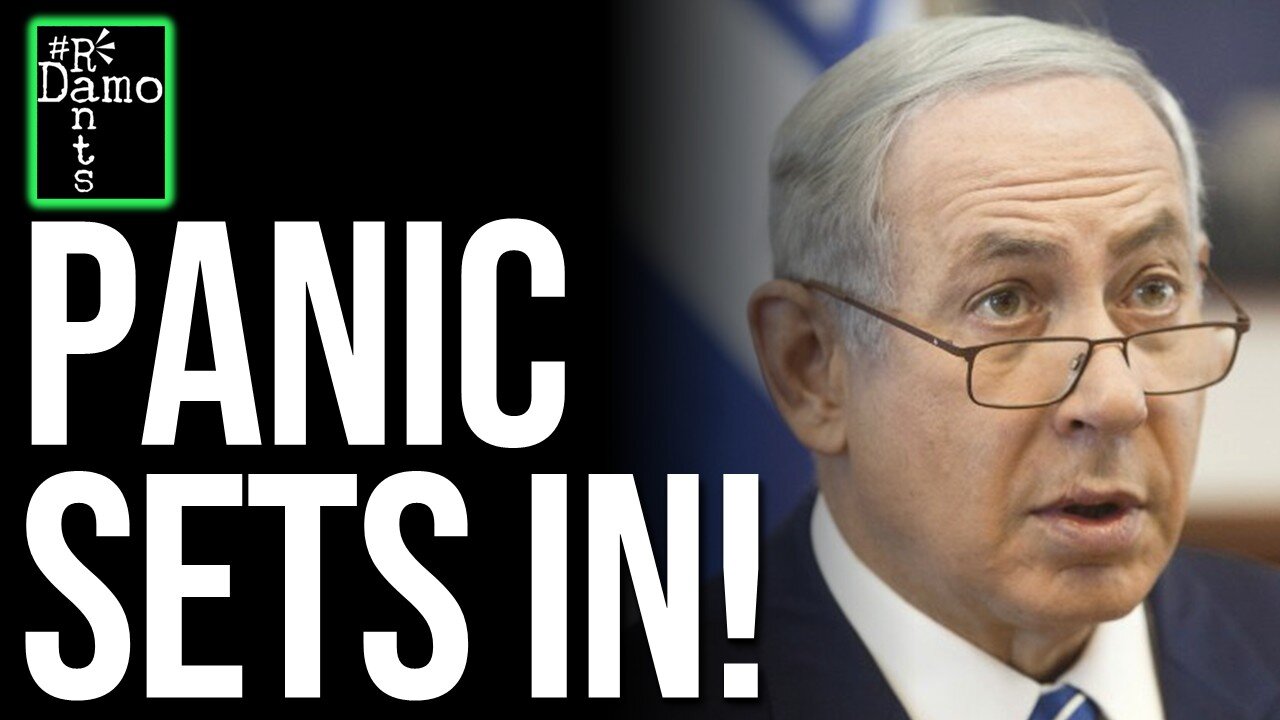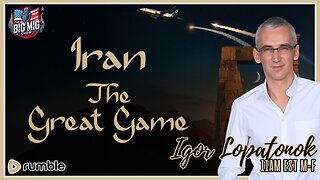Premium Only Content

Tehran Secures Chinese Support — And Israel is Freaking Out
Right, so Israel’s diplomats would have you believe that the great threat of 2025 is not the airstrikes they launched on Iran back in June, nor the genocide they continue to advance in Gaza, but the possibility that Beijing might be selling Tehran a few barrels of rocket fuel. The nuclear-armed aggressor as Israel is, though they deny it still, insists it is the victim, the state that struck first now trembles at the thought of being struck back, and the empire of impunity is reduced to a chorus of panicked op-eds warning that “bad actors” are making self-defence too easy for its enemies. Well how dare they? Strip away the sanctimony and the truth is simple though: Israel’s complaint is not that Iran might attack unprovoked, but that it might dare to survive the next Israeli strike allegedly coming in the very near future. China is aiding its economic partner Iran to restock its missiles, after having expended a good many of them in self defence, and Israel are whining that that means they’ll be able to strike back if they attack them again. Well maybe you should perhaps just not do that then eh?
Right, so Israel are on an anti-Iranian whinge again and the mainstream dutifully jumps to their tune. The Wall Street Journal declared that Iran had ordered “thousands of tons of ammonium perchlorate” from China — enough to fuel hundreds of ballistic missiles. The Financial Times warned of cargo ships already en route with over 1,000 tonnes of sodium perchlorate — sufficient for around 260 rockets. Israel Hayom printed Beijing’s denial, insisting it does not export arms to warzones. Meanwhile, The Cradle carried an altogether sharper claim though: Israel is anxious about a surge of military cooperation that may involve not just materials but potential surface-to-surface missile trade.
What is truly being threatened is not Israel’s existence at all, but its long-standing impunity to strike others without fear of reprisal. Back in June, Israel launched unprovoked airstrikes on Iranian nuclear facilities, assassinating scientists and military figures. Tehran’s retaliation — a storm of missiles and drones — tore through Israel’s famed defences and left sensitive sites damaged. For the first time in decades, Israel discovered that Iran could not only fire back, but hit its mark.
Western intelligence agencies feign “confusion” about Beijing’s intentions here and now though. What is their deal? We aren’t sure of China’s intentions. But China’s intentions are the same as any other allied nation and trade partner – in this case its secure cheap Iranian oil, protect Belt and Road corridors, undercut US–Israeli dominance, and win moral authority by condemning the genocide in Gaza. Israel’s shrill anxiety is not fear of annihilation but fear of justice.
Israel’s present anxiety cannot be separated from its decades-long reliance on pre-emptive strikes. Its military doctrine — known as the “Begin Doctrine” after Prime Minister Menachem Begin — was crystallised in 1981 when Israeli jets destroyed Iraq’s Osirak nuclear reactor. Israel justified the strike as “preventive defence,” insisting it could not allow any rival to acquire capabilities that might one day threaten it, even though they already had nukes themselves.
This logic repeated itself in 2007, when Israeli aircraft destroyed a suspected Syrian reactor at Deir ez-Zor. It has shaped countless cross-border operations in Lebanon, Syria, and even Sudan, where Israeli forces struck alleged weapons convoys. The doctrine is simple: eliminate threats before they mature, regardless of legality or consequence, because lets face it, when does Israel ever face any?
For decades, Israel could follow this strategy with relative impunity because its adversaries lacked the means to retaliate directly. Lebanon’s Hezbollah developed rockets but rarely long-range precision missiles; Syria was weakened by war; Iraq collapsed under US invasion. Iran remained the only actor with the resources to challenge Israel’s freedom of action. Thus the Iranian nuclear programme became an obsession, and Tehran’s missile arsenal a source of constant dread. Netanyahu’s 30 year long determination that Iran are developing nuclear weapons is not by accident.
So the June airstrikes on Iran fit squarely within an established historical pattern. But unlike Osirak in 1981 or Deir ez-Zor in 2007, Iran was neither unprepared nor defenceless. This time, the target fired back. The target was very much more than capable of doing so.
When Israel struck Iranian nuclear facilities and assassinated senior commanders, Tehran responded not with diplomatic complaints but with missiles. Over 170 ballistic missiles and drones were launched in coordinated waves. Israeli defences — Iron Dome, David’s Sling, Arrow 3 couldn’t stop them all. Missiles broke through, striking infrastructure in the Negev and damaging military facilities across Israel.
Israel’s missile shield, long marketed as impenetrable, was turned into Swiss cheese. For Israeli policymakers, this was not just a tactical embarrassment but a strategic revelation, a humbling one: another pre-emptive strike on Iran would guarantee a punishing counter-blow and this one would undoubtedly be worse.
The cause-effect sequence therefore is a matter of record: Israel struck first, so Iran retaliated and Israel discovered its defences were vulnerable. That fact, not speculation, explains the ferocity of Israeli media campaigns about Chinese–Iranian cooperation now.
It was not the reality of missiles in Iran’s hands that changed in June — Tehran has possessed them for years. It was the proof that they could penetrate Israel’s shield. For Israel, that psychological shift was devastating.
The hard evidence points primarily to dual-use chemical materials. The Wall Street Journal reported that Iran ordered thousands of tons of ammonium perchlorate from China — enough to fuel hundreds of ballistic missiles. The Financial Times noted that 1,000 tonnes of sodium perchlorate had already been shipped, sufficient for 260 mid-range rockets. These numbers matter because solid propellant is the bottleneck in missile production. Without it, Iran’s arsenal stagnates; with it, production can accelerate and they are not planning on leaving themselves defenceless, who would after all?
But here interpretations diverge. Mainstream Western outlets frame these transfers as aggressive, destabilising, even illegal. Alternative outlets, such as The Cradle, emphasise that Israel’s real fear lies in potential surface-to-surface missile cooperation — weapons rather than raw materials.
Iranian and Chinese officials deny arms transfers outright. “A lie repeated a thousand times is still a lie,” Beijing’s envoy told Israel Hayom, insisting that China does not export arms to countries at war. But denials aside, what matters strategically is that Israel now believes Iran will soon be able to reconstitute its missile stockpiles, though Iran very much is believed to still have a substantial arsenal nonetheless. Whether through materials, technology, or finished systems though, the outcome is the same: Iran’s deterrence will be restored.
Yet here lies the central inversion. Israel consistently rebrands deterrence as aggression. Why? Because its entire doctrine of security depends on one-sided violence. For decades, Israel has bombed Iraq, Syria, Lebanon, and Gaza with near-total impunity. Such impunity is only possible if adversaries lack credible means of retaliation.
Iran’s missile arsenal upends that model. Missiles do not necessarily give Tehran the power to conquer Israel, that’s not their goal, but they give it the power to impose costs. That alone is intolerable to a state accustomed to unilateral force.
Israel’s Ambassador to the US Yechiel Leiter’s recent statement epitomises this projection. Israel, he said, must ensure that China or “other bad actors” do not allow Iran to reconstitute missiles, because such support “threatens our very existence.” The mirror test exposes the hypocrisy. Israel is the nuclear-armed aggressor with a record of pre-emptive strikes; Iran is the conventional power seeking deterrence and has only sought to defend itself against an aggressor; China is demonised not for destabilising the region, but for denying Israel a monopoly on force. The fact they rival the US as well just a bonus.
So we have a scenario where Israel bombs first, Iran retaliates, China enables deterrence and then Israel cries existential threat, woe is us, we are the victims.
The divergence between media outlets illustrates how narratives are therefore weaponised according to given bias.
The Wall Street Journal frames Chinese materials as “arming Iran,” omitting that the items are dual-use chemicals with civilian applications too. The Financial Times echoes this framing, warning of “hundreds of missiles” as though transfer of raw inputs equals imminent attack. By contrast, The Cradle contextualises Israeli anxiety, highlighting that what terrifies Tel Aviv is not Iranian aggression but Iranian resilience. Israel Hayom, aligned with the Netanyahu government, printed Beijing’s denial but framed it as evasive.
This media ecosystem reveals more than facts, it’s a lesson to us all to not stake our claim to be well informed by simply sourcing your news from one outlet: it reveals intentions. Western outlets sensationalise to justify sanctions or intervention. Israeli outlets amplify fear to legitimise pre-emptive strikes. Alternative platforms reframe the issue through the lens of balance and deterrence.
In each case, the same events — a shipment of chemicals — become radically different stories depending on the political interest at stake.
China’s involvement is not mysterious. Its calculus is straightforward.
First, energy security: Beijing secures discounted Iranian crude oil, a vital hedge against volatility elsewhere.
Second, trade corridors: Iran sits at the heart of the Belt and Road Initiative’s Eurasian routes. Stability in Tehran ensures Chinese goods and capital can flow westward without US choke points affecting it.
Third, geopolitical leverage: by binding Iran closer to itself, Beijing gains a lever over the Middle East that Washington cannot easily counter.
Fourth, moral legitimacy: China has consistently condemned Israeli atrocities in Gaza and across the region, aligning itself with the anger of the Global South. This is not merely rhetoric but a calculated investment in “soft power capital.” By positioning itself on the right side of history, Beijing bolsters its global standing.
Thus the logic is perfectly logical even in western intelligence claims to be dumbfounded: oil, trade, leverage, legitimacy. All at minimal cost to China.
The legal double standards are staggering as well though. Israel sits outside the Nuclear Non-Proliferation Treaty (NPT) with an undeclared arsenal of 80–200 nuclear warheads. It faces no sanctions, enjoys US protection, and refuses inspections. Iran, by contrast, remains within the treaty, has endured intrusive IAEA oversight, which has largely now been restricted due to the lack of trust, and possesses no nuclear weapons because they are forbidden both under the terms of the NPT and the religious fatwa imposed by Ayatollah Khamenei. Its missile programme, entirely conventional, is cast as destabilising nonetheless.
Here though, international law at least provides some clarity. Missiles, unless carrying nuclear warheads, are not banned. Dual-use materials like ammonium perchlorate are regulated but not prohibited. China, as a permanent member of the UN Security Council, remains legally free to sell such goods unless specifically sanctioned.
What is destabilising is not Iran’s right to deterrence, but Israel’s repeated violation of sovereignty through preventive attacks. That inversion — the nuclear aggressor cast as victim, the conventional defender cast as aggressor — reveals the hollowness of Western legal rhetoric that gets amplified by their media.
The Gulf monarchies tread carefully. Saudi Arabia and the UAE are deeply dependent on Chinese trade and investment. China is their largest oil customer as well as it happens and a critical investor in infrastructure. These states will not openly oppose Beijing.
Indeed, their acceptance of the Chinese-brokered Saudi–Iran rapprochement in 2023 demonstrates recognition of this new balance. For Riyadh and Abu Dhabi, stability matters more than Israeli preferences do, normalised state or not. A stronger Iranian deterrent may paradoxically reduce the risk of reckless escalation, something Gulf rulers privately welcome.
Publicly, however, they remain muted, unwilling to antagonise Washington, they sit on the fence like few others can.
Israeli media speaks of “anxiety.” The deeper truth is strategic decline though. Militarily, its impunity to strike has been eroded. Politically, its moral legitimacy has completely collapsed, exposed by its campaign in Gaza which even Israeli NGOs such as B’Tselem and Physicians for Human Rights–Israel now call genocidal. Diplomatically, its Western shield is cracking as Global South states, emboldened by China, at least in part, Iran too, demand accountability.
The panic about China–Iran cooperation is therefore less about missiles than about hegemony. It signals recognition that the Western led way of things is ending. Multipolarity is no longer a theory but a lived reality in which Israel can no longer dictate terms unilaterally.
Looking ahead, several trajectories are possible.
If Israel launches another strike on Iran before year’s end, something being heavily implied, if for no other reason than to get Netanyahu out of giving evidence in his corruption trial 4 days a week from November, Tehran will almost certainly retaliate with even greater force than last time, especially if Chinese assistance accelerates missile production. Such retaliation would risk drawing in the US, but it would also expose Washington to a conflict it cannot easily control.
If, by contrast, deterrence stabilises the balance, a new equilibrium may emerge. China’s role as Iran’s backer and mediator could entrench Beijing as the indispensable power in the Middle East, relegating Washington to the margins.
Either outcome signals Israel’s loss of dominance though. The only question is whether decline comes through reckless escalation or grudging acceptance of deterrence. I daresay we’ll find out before the year is out.
What, then, is happening in reality therefore? Iran rebuilds its arsenal because Israel bombed it first. China assists because it secures oil, stability, leverage, and legitimacy. Israel panics because its doctrine of impunity is collapsing.
The “existential threat” Israel invokes is not annihilation but accountability. What terrifies Tel Aviv is not an unprovoked Iranian strike, but the certainty of retaliation the next time Israel chooses that option themselves.
Where Iran are happily supplying China with oil though, so Azerbaijan is happily supplying Israel with the same stuff and a new deal brokered by Trump right on Iran’s northern border that may supply even more of the black stuff to the genocidal apartheid state has not gone down well in Tehran so find out all about that story in this video recommendation here as your suggested next watch.
Please do also hit like, share and subscribe if you haven’t done so already so as to ensure you don’t miss out on all new daily content as well as spreading the word and helping to support the channel at the same time which is very much appreciated, holding power to account for ordinary working class people and I will hopefully catch you on the next vid. Cheers folks.
-
 UPCOMING
UPCOMING
Trumpet Daily
21 minutes agoTrumpet Daily LIVE | Oct. 3, 2025
-
 1:01:09
1:01:09
VINCE
2 hours agoMadness In Portland - Conservatives Arrested? | Episode 139 - 10/03/25
133K127 -
 LIVE
LIVE
Nikko Ortiz
1 hour agoReaction Time.... | Rumble LIVE
135 watching -
 LIVE
LIVE
Badlands Media
13 hours agoBadlands Daily: October 3, 2025
3,928 watching -
 LIVE
LIVE
Caleb Hammer
3 hours agoNo F*cking Way | Financial Audit
133 watching -
 LIVE
LIVE
The Big Mig™
3 hours agoIran The Great Game w/ Igor Lopatonok
7,599 watching -
 1:40:17
1:40:17
Dear America
3 hours agoDem Shutdown Just Gave Trump FULL POWER To Slash The Government!!! + TPUSA Speaks Out!
87.1K57 -
 LIVE
LIVE
Viss
1 hour ago🔴LIVE - The Tactics You Need To Dominate The Battleground - PUBG 101
73 watching -
 LIVE
LIVE
iCkEdMeL
2 hours ago $1.08 earnedChicago Erupts in ICE Protest as Diddy Faces Judge’s Hammer
98 watching -
 1:01:12
1:01:12
Crypto Power Hour
3 hours ago $0.67 earned#1 AI Driven BTC & ETH Crypto Trading Platform w/ Max Pace
15.9K7
